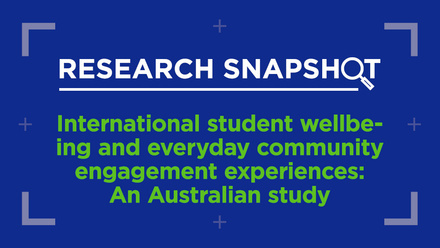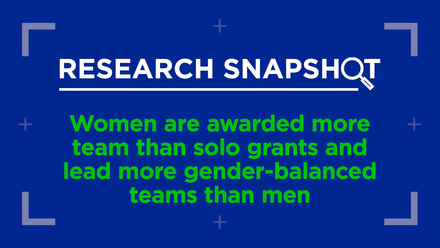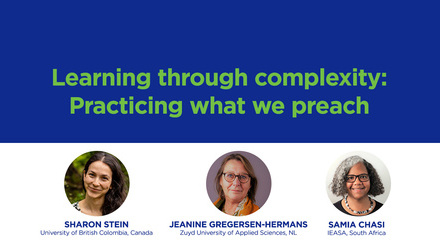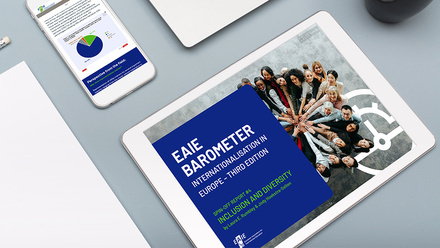Educating active global citizens: Introducing a new educational framework

Every generation has the opportunity to prepare the coming generations for the future and, in turn, shape such a future. The challenges we face — ranging from climate change and rising inequality to xenophobia and misinformation — demand education to no longer be solely about imparting knowledge; it must also help learners develop a dependable sense of direction and equip them with capacities to understand and address current and future challenges and opportunities.
Global citizenship education (GCED) emerged as a vital response to this need as transversal educational approaches that aim to empower learners of all ages to assume active roles, both locally and globally. But how exactly do we define what it means to be a responsible global citizen? What principles and learning outcomes can guide educational institutions committed to GCED in developing learning programmes and curricula?
These are some of the aspects set forward in the new Framework for Active Global Citizenship developed by AFS Intercultural Programs (AFS) with Veronica Boix-Mansilla’s conceptual leadership and in close collaboration with a committee of educational experts and practitioners. Building on the experience of AFS and its century-old commitment to promoting intercultural understanding and positive global impact, this framework is a tool that can be used by other education institutions and practitioners who are committed to bridging distances, deepening understanding and working for a world where people feel connected across cultures.
Why global citizenship education now?
Today, we see a greater need than ever to help people develop the capacities to care for and contribute to the world.
The very forces that created opportunities for mutual understanding across cultures have also made our world more volatile and complex. Accelerated global interactions, digital connectivity and travel have brought us together and transformed how we perceive and interact with our planet and its people. These forces have also given rise to nativism and xenophobia, rooted in increasing fear of the other and political polarisation. Furthermore, they have shed light on the challenges of environmental degradation, economic inequality and mass migration that require global solutions.
In this environment, educators have a unique opportunity — and responsibility — to equip students with the knowledge, skills and attitudes necessary to navigate and address these challenges effectively.
Education approaches grounded in the notion of global citizenship are not new. They have deep historical roots, one of which is connected to the movement towards peace education that emerged after World War II with the creation of the United Nations Educational, Scientific and Cultural Organization (UNESCO). Organisations such as AFS were born in this context, providing international exchange opportunities for youth to cultivate awareness of other peoples and build friendships across borders to avoid conflicts and promote mutual understanding.
Initially grounded in peace education and intercultural understanding, as globalisation intensified in the second half of the 20th century, educational approaches related to global citizenship also began to address the growing interdependence of nations and the need for learners to understand and navigate the complexities of globalisation.
Over the last decades, the momentum behind GCED gained further significance with the adoption of the United Nations' 2030 Agenda for Sustainable Development. Sustainable Development Goal (SDG) 4 emphasises inclusive and equitable quality education, with Target 4.7 highlighting the role of global citizenship education next to education for sustainable development.
Recent events, like the COVID-19 pandemic, have also reinforced the role of GCED in helping learners understand the interconnectedness of health, economics and social systems. These global disruptions have also prompted a re-evaluation of educational priorities, driving a renewed focus on equipping students with the tools to navigate uncertainty and complexity while fostering a sense of global responsibility.
To ensure a more peaceful, just, equitable and sustainable future for all, we need a type of GCED that develops responsible 'citizens of the world': people who can deepen their insight into the world and our interdependence to engage in transformative intercultural understanding and dialogue, and to take action on behalf of the planet and its people.
One approach to global citizenship education: The AFS Framework
The AFS Framework for Active Global Citizenship provides a structured approach to GCED. This framework defines active global citizenship and outlines what are the abilities crucial for educators to foster in their learners. According to the framework, active global citizens are people who are informed and compassionate and whose ethical compass drives them to lead lives and make decisions that contribute to a more just, equitable, peaceful and sustainable world.
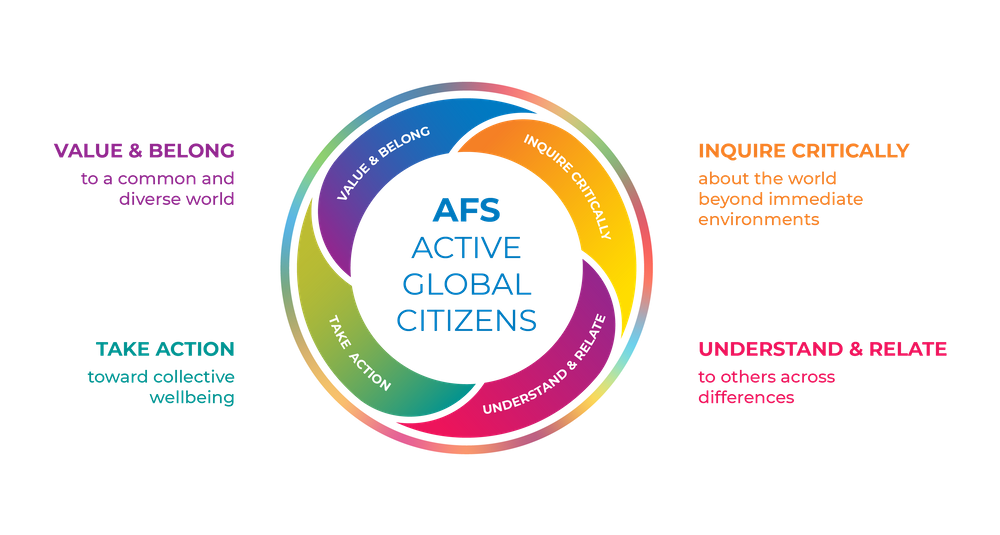
The framework emphasises four core areas of development crucial for active global citizenship:
- Value & belong to a common and diverse world: Active global citizens understand themselves as belonging to a common and diverse world for which they care, responsibly committing to uphold values of human dignity and diversity.
- Inquire critically about the world beyond immediate environments: Active global citizens inquire critically about local, global and intercultural issues beyond their immediate environments, showing curiosity to manage information from reliable sources and being critical of how information is used. They value trustworthiness.
- Understand and relate to others across differences: Active global citizens engage in understanding and relating to others across differences, being able to take perspective with empathy and compassion, and committing to dialogue and respect.
- Take action toward collective well-being: Active global citizens are committed to taking action, considering local and global challenges and often working with others to put into practice informed, ethical and reflective actions (from small personal ones to collective community-level ones) that contribute toward a more just, equitable, peaceful and sustainable world. They value courage and resilience in the face of adversity.
Aligned with global education goals set forth by UNESCO, the OECD and other leading organisations, the framework aims to help educational institutions provide a holistic approach to GCED. This approach includes integrating intercultural and global learning into curricula, promoting experiential learning through exchange programs and encouraging civic engagement.
Challenges and considerations for implementing GCED
While implementing GCED approaches, such as the one proposed in the AFS Framework, several factors warrant attention:
- Local relevance: Educators should contextualise GCED to reflect the students’ lived experiences and local challenges, making global issues personally relevant.
- Resource constraints: Many institutions face challenges in providing the technology, materials, or training necessary for implementing effective GCED. Strategies like collaborative online international learning (COIL) or virtual exchanges can help bridge gaps, offering access to diverse perspectives without requiring travel.
- Avoiding simplification: GCED must avoid oversimplified narratives that fail to address the underlying complexity of global issues. Educators can encourage critical thinking by guiding students to question sources, recognise biases and reflect on their assumptions.
- Equitable access: Ensuring GCED is accessible to all students is crucial. Education institutions can create inclusive learning environments by fostering respectful dialogue, valuing diverse viewpoints and addressing barriers that prevent marginalised groups from participating fully.
- Sustained engagement: GCED requires continuous reflection and learning. It is not a one-time lesson but an ongoing practice that integrates global awareness into students’ everyday lives.
Practical steps for educators to foster global citizenship
Educators looking to implement GCED aimed at developing active global citizens can consider the following steps:
- Embed GCED across disciplines: Incorporate global issues within multiple subjects, whether it’s exploring environmental science in biology or studying migration patterns in geography.
- Encourage experiential learning: Activities like local service projects, cross-cultural dialogues and collaborative online initiatives give students the chance to apply their learning to real-world situations.
- Promote critical inquiry: Foster an environment where students feel encouraged to question assumptions, examine biases and seek information from diverse sources. This habit strengthens their ability to engage thoughtfully with global issues.
- Build empathy and perspective-taking: Integrate activities that encourage students to understand and relate to experiences outside their own. Such practices help students develop compassion, respect and solidarity with people from different cultural backgrounds.
- Support action-oriented learning: Encourage students to take small steps that address global challenges within their communities. Educators can guide students to recognise how their local actions connect to broader global efforts.
A call to action: Embracing global citizenship education
The world needs active global citizens who can bridge cultural divides, understand complex challenges and work toward a more just and sustainable future. As educators, we are responsible for nurturing these qualities in the next generation. GCED provides the tools and values necessary for doing so. By embracing it and integrating its principles across educational practices, we can collectively shape a future where active global citizenship is a core part of quality education and an essential part of every student’s learning experience.
While the AFS Framework offers a valuable approach, the broader GCED movement encompasses diverse methods and adaptable strategies to inspire and empower students to make a meaningful impact in the world. We invite other educators, policymakers and organisations to join us in this transformative journey.

